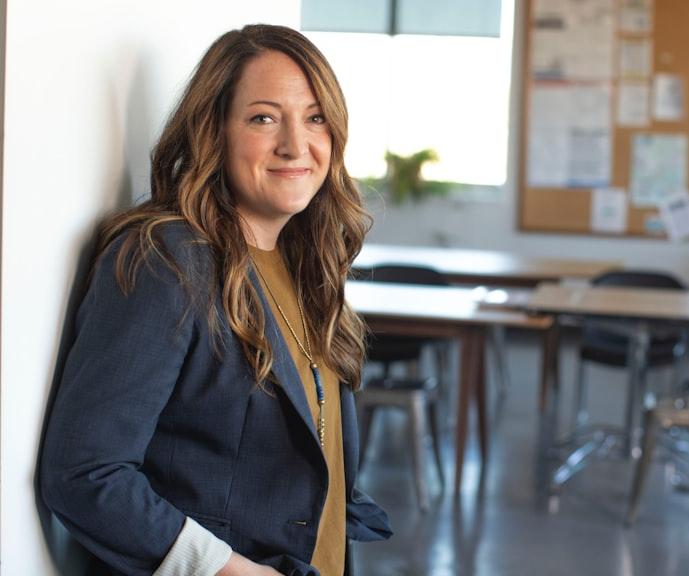 Photo by M. Monk on Unsplash
Photo by M. Monk on UnsplashClassrooms are a plethora of diversity.
Each student comes with their own set of beliefs and their own unique needs, behaviors, strengths, and weaknesses.
Teachers must recognize the uniqueness of each student for them to feel included and motivated. This requires an inclusive classroom management system that ensures all students will benefit equally within the classroom environment.
However, classroom diversity is as abundant as spices are in flavoring foods. How can a teacher adapt classroom management plans to be inclusive?
Let's explore some classroom scenarios!
Mr. Clark's Room
 Photo by Usman Yousaf on Unsplash
Photo by Usman Yousaf on UnsplashMr. Clark's 6th-grade math class is a whir of students from various backgrounds:
Mauricio is an English language learner (ELL)
Owen has ADHD
Ella and Rob have learning disabilities
Willow is an academically gifted student
Today, Mr. Clark is teaching fractions. He plans to present a slideshow with definitions and examples then move to guided practice and independent practice of fraction problems before assigning a take-home practice problem for the day.

As Mr. Clark teaches, he notices confused looks on student's faces. During guided practice, Mauricio hesitates to ask for help, Owen fidgets in his seat and is disruptive, and Ella stares at her desk while Rob crumples his paper. Willow breezes through the assignment with ease.
Mr. Clark assigns an independent worksheet and then collects it at the end of class. He notices Mauricio, Ella, and Rob attempted only one question while Owen attempted none. Willow proudly turns in her work with all questions completed.
An analysis of this scenario shows that Mr. Clark's classroom lacks inclusive practices and supportive relationships. He may not have established procedures for asking for help or expressing frustration. These things will lead to student disengagement and failure.
Also, Mr. Clark should consider the varied learning levels of each student and then adjust his lessons to accommodate each student's learning needs.
What should Mr. Clark do?

Instead of this...
Lectures that are one-size-fits-all approaches
Presentations that may not be engaging
A lack of differentiation of material and learning abilities support
A lack of inclusion and accommodation for all learners
Rigidly teaching the content assuming everyone is at the same level
Mr. Clark should try this...
Use various activities, visual aids, and hands-on activities
 Owen might benefit from using fraction tiles, Lego blocks, or an interactive fraction game.
Owen might benefit from using fraction tiles, Lego blocks, or an interactive fraction game.
Hold group discussions about content
 Mr. Clark might know how to help students better by asking what they know about fractions.
Mr. Clark might know how to help students better by asking what they know about fractions.
Propose real-world or culturally relevant material
 Willow might be more challenged when asked to divide a cake into equal portions for a birthday party.
Willow might be more challenged when asked to divide a cake into equal portions for a birthday party.
Foster a culture of inclusivity and empathy
 Both Ella and Rob might benefit from Mr. Clark seeking understanding about their behavior toward the assignment.
Both Ella and Rob might benefit from Mr. Clark seeking understanding about their behavior toward the assignment.
Provide additional scaffolding, resources, and challenges
 Mauricio might benefit from a guide that shows him how to ask for help.
Mauricio might benefit from a guide that shows him how to ask for help.
Ms. Gill's Class
 Ms. McGill’s 7th grade English class has been reading about the gods and goddesses of Greek and Roman mythology. A Muslim student named Shama has been reluctant during the lessons sitting quietly at her desk, visibly disengaged from the class.
Ms. McGill’s 7th grade English class has been reading about the gods and goddesses of Greek and Roman mythology. A Muslim student named Shama has been reluctant during the lessons sitting quietly at her desk, visibly disengaged from the class.
 Photo by Rachid Oucharia on Unsplash
Photo by Rachid Oucharia on UnsplashMrs. McGill assigns an online writing assignment asking students to create their version of a god or goddess. Shama refuses to do the assignment. Ms. McGill becomes frustrated with Shama's behavior and pulls her aside to discuss her actions in class.
Shama reveals to Mrs. McGill that she finds the material goes against her religious beliefs. She believes in one God, not many, and finds learning about Greek and Roman gods and goddesses disturbing.
An analysis of this scenario shows that Ms. McGill’s lesson didn't consider Shama’s beliefs, which led to her reluctance in class.
Quiz
What should Mrs. McGill do? Select all that apply.
Take Action
 Photo by Prateek Katyal on Unsplash
Photo by Prateek Katyal on UnsplashAdapting your classroom management system means setting procedures, establishing routines, and building relationships with students (as well as their parents).
These important elements will help your classroom run smoothly and provide students with a positive learning environment. Check out these Bytes to learn more:
Your feedback matters to us.
This Byte helped me better understand the topic.
